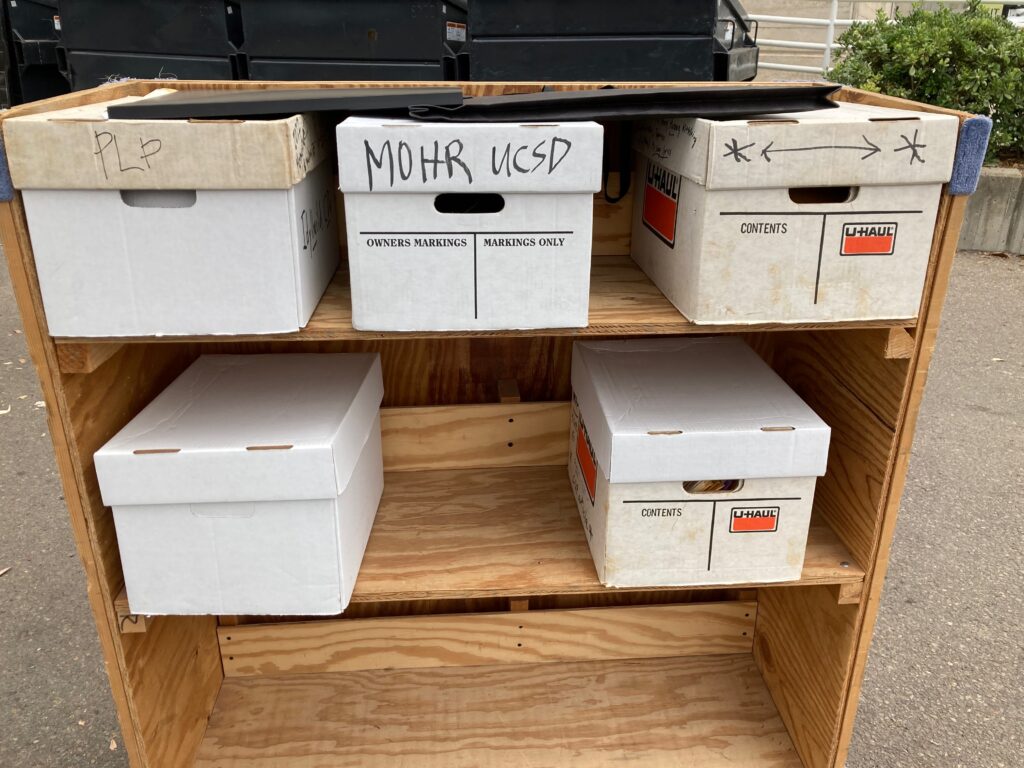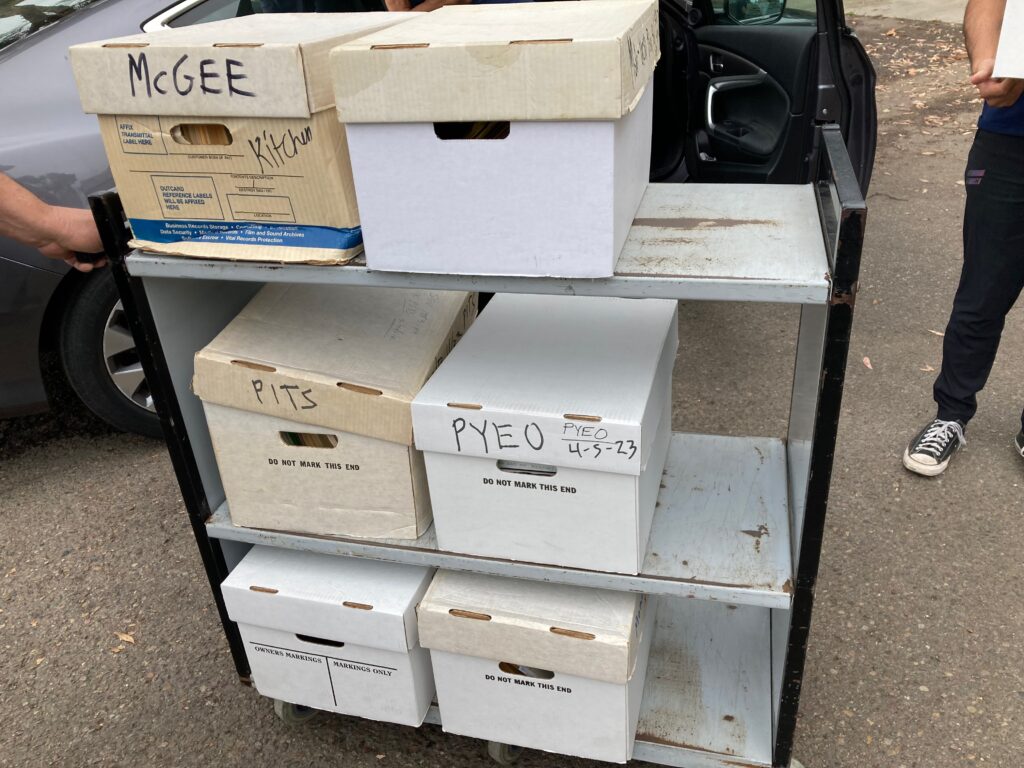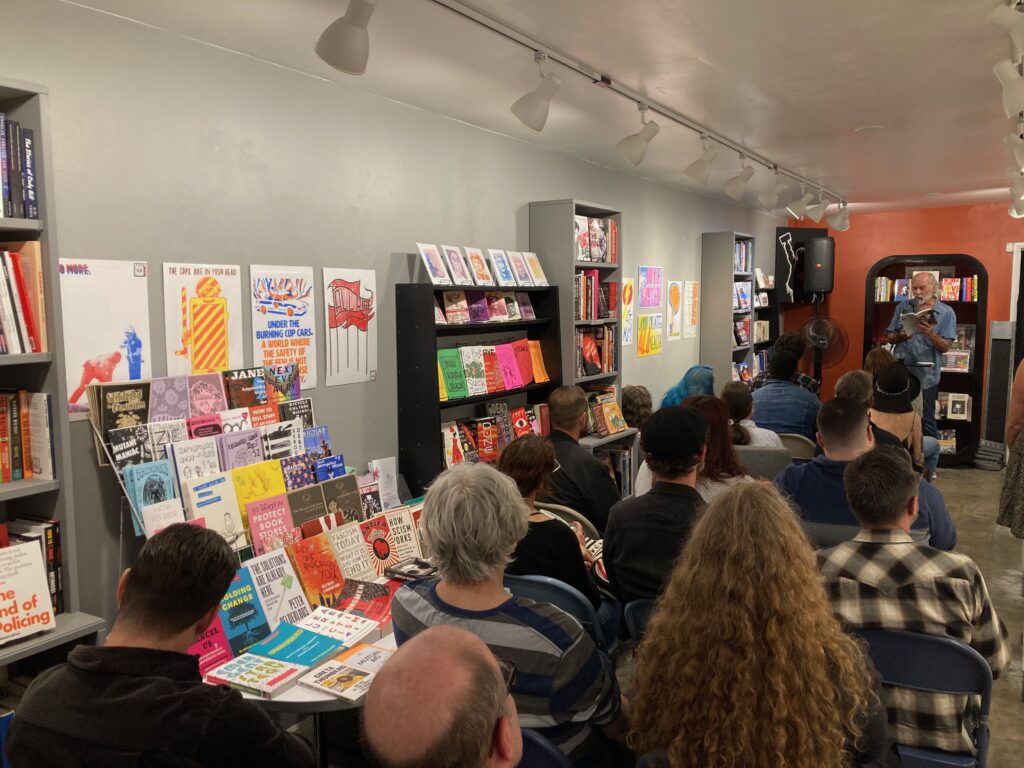Sunday morning, September 17, 2023
On Friday morning, Linda and I drove down to the University of California, San Diego with another increment of material for the Archive for New Poetry. After handing off the boxes, Lynda Claassen, took us to lunch along with Nina and Carla, who have been in charge of cataloguing my material, after which we went over in detail some of the cassettes and CDs I had brought alone. Carla, in particular, had questions about my use of the Compugraphic 7500 typesetting machine to produce some of the material that she has encountered so far. The trip down was exceptionally quick: an hour and a half. The return took an hour longer, but I was so happy about getting these boxes out of my workspace at home that the drive seemed far less onerous than usual. I have delivered over 50 boxes up to this point, and am finally heading down the home stretch. Other L.A.-based poets whose archives are at UCSD, by the way, include Harry Northup, Holly Prado, Lee Hickman, Paul Vangelisti, Doug Messerli, Dennis Phillips, Mark Salerno, and Bob Crosson. Wanda Coleman’s archives are at UCLA, along with those of Stuart Z. Perkoff. Among other poets who appeared in POETRY LOVES POETRY and whose papers are archived include Dennis Cooper, David Trinidad, and Ed Smith (all at New York University); and Bob Peters (University of Kansas). Both Momentum Press and Cahuenga Press (which I was a co-founder of along with Cecilia Woloch, Prado, Northup, MacAdams, and Cushing) have their papers at UCSD, too.
The next morning I had to begin work on the final draft of what I was going to say at the “Tribute to Harry Northup,” for S.A. Griffin had specifically asked me to talk longer than five minutes, if that’s what I needed in order to give a proper, formal introduction to Harry, who would speak at the end of the tribute. That event, which had been in the planning stages by Susan Hayden and S.A. Griffin before the pandemic started in 2019, went very well, although technical problems unfortunately prevented Laurel Ann Bogen from being part of it. I myself and S.A. Griffin also had difficulties logging on. I have no idea, however, of what excuse Jim Cushing and Celeste Goyer had for being late and barging into the conclusion of the program; not that I was surprised at Cushing’s rude grandstanding. While he is a very fine poet and has written eloquently as a critic about L.A. poetry, he seems unable to put his personal grievances against me to the side in service of the community.
There are two poets I wish could have been part of this tribute to Harry Northup: Suzanne Lummis and Joe Safide. The former is the editor whose anthologies during the past quarter-century have been assiduous about including Harry Northup’s poetry; Safdie’s essay on ENOUGH THE GREAT RUNNING CHAPEL (Momentum Press, 1982), which appeared in POETRY FLASH forty years ago, should be required reading by anyone who admires Northup’s writing.
Finally, I would like to add my recollection of an instance of Harry Northup’s kindness, which several people spoke of yesterday. In 1983, my car broke down one afternoon when I was in Rowland Heights in the San Gabriel Valley. I was teaching for the California Arts Council, trying to survive on about $7,500 a year take home pay as an “artist in residence” for the CAC. After I had the car towed to a repair show run by an Ethiopian mechanic who proved to be very patient about me paying the repair bill, I called Harry and asked if he could give me a ride home. Without hesitation, he offered to do so, and he then drove out all the way to Rowland Heights and got me home, and then went back home himself. An eighty-mile round trip, done on the spur of the moment, with no hesitation to help out a fellow poet. Perhaps Harry doesn’t even remember this, but such a recollection brings to mind the only lines of Wordsworth’s that have ever truly resonated for me: “That best portion of a good man’s life, / His little, nameless, unremembered acts / of kindness and of love.” It does nothing to diminish what Harry did for me to name it. Thank you again, Harry. I was more desperately sad back then than you might ever have suspected.
No sooner was the Zoom event over than I had to take a quick shower and head over to Page Against the Machine to read with Fred Voss at 6 p.m. This was the fifth time, I believe, that I have given a reading with him as one of the featured poets, and I was more impressed than ever. Fred gave in my opinion the reading of the year: column, funny, poignant, his themes enlivened all who attended, which included several of my former or current students.


*************************
Tribute to Harry Northup
Hosted by Beyond Baroque Literary Arts Center and Quentin Ring
Organized by Susan Hayden and S.A. Griffin
This event also featured George Drury Smith, the founder of Beyond Baroque, which is turning 55 years old in 2023, Amy Gerstler (who read in a perfectly modulated voice Harry Northup’s “the images we possess kill the capturing”); David Lloyd Glover; Jack Skelley; Amelie Frank; Jeannette Clough; Adam Saroyan; Courteney Bailey; Beth Ruscio; Bob Beitcher; Jennifer Clymer; Corinne Conley; Michael C. Lord; Richard Modiano; Cushing; Goyer; Holiday Mason; Sarah Maclay; Gail Wronsky; and Pam Ward.
Statement by Bill Mohr:
When I was appointed the first poetry editor of Papa Bach Bookstore’s nascent literary magazine in the Fall of 1971, I hustled off to the Wednesday night Beyond Baroque poetry workshop, and encountered a number of poets whose work I selected for the first issue, including the poet-actor Harry E. Northup. When I started attending the workshop on a regular basis, Iquickly discovered that, even among this group of maverick poets, Harry Northup’s voice stood out for its impetuous clarity. “Here,” I remember thinking to myself, “is a poet impatient with any hint of predictability.” Harry went on to appear in my own poetry magazine, Momentum, and to become one of the first poets published by my publishing project, Momentum Press. Along with books by Jim Krusoe, Lee Hickman, Holly Prado, Alicia Ostriker, and Jim Moore, Harry Northup’s Eros Ash and Enough the Great Running Chapel remain emblematic of that period in Los Angeles poetry.
In getting Harry’s writing out into the world. I want to mention someone who was crucial to Harry’s maturation as a poet. Yes, as Harry has often mention, Lee Hickman turned him on to poetry when they were both young actors in New York City, but Hickman also did something in the early 1980s that was beyond astonishing. I had proposed to Harry, when he inquired about publishing one of his manuscripts that we do a large book of his work, but I desperately needed a typesetter even more familiar with Harry’s work than I was. Fortunately, Lee Hickman drove over to Beyond Baroque and in a mere dozen hours typeset almost perfect copy of 200 pages of dense, lyrical poetry. The smallest room on the second floor of Beyond Baroque, where that work was done, remains consecrated in my memory as the place where Harry’s poems initially attained in print culture the visibility they had so long deserved. It is fitting, therefore, that Beyond Baroque has been the host for this event, for the attachment between Harry and L.A.’s oldest literary venue is not just a matter of the affection of his audience and readership; rather, Beyond Baroque has served as an instance of how its facilities have given his words a permanent place in the ongoing legend of a perpetual renaissance on the West Coast of the United States. Today we have gathered together as poets living and working in Los Angeles, but the radical quality of Harry’s poetry should not be limited to some myopic understanding of the so-called “local.”
It should be said that Harry, in particular, is one of the authentic heirs of Jack Spicer’s poetry and poetics. I might well be the only one today who mentions Jack Spicer, but I would be remiss if I did not mention him. Harry’s poems, in Enough the Great Running Chapel, for instance, exemplify Spicer’s proposition that only the poem in series is a transmission worth fully absorbing; and, like Spicer, there is in Northup’s poetry an utter refusal to submit to the blandishments of commodified poetics or the careerism that marks so much contemporary work. The antinomian spirit of American poetry radiates throughout Harry Northup’s work. I myself remain especially fond of sequences such as “I Cut My Mind Open In an Esso Station” or “The Lord Is My Preposition.” Harry has no idea of how often I have thought of his line, “sweetzer and sunst let me out poor sold torn patience.” His is a street-level metaphysics: only Harry Northup knows how to make a poem dolly down the aisle of a bus, tracking the progression of a passenger toward that which most repulses him; and only Harry Northup can turn from that gritty scene and allow us to find succor in his own love for his poet-spouse, Holly Prado.
Finally, in this era where the blurb on the back cover of a book has replaced insightful, extended commentary, it can be a jolt to realize that once upon a time a Los Angeles poet received not just brief notices, but substantial reviews. It was a special thrill for me to hear from Jim Cushing today, for he wrote one of the two best reviews that Harry has ever received, and I wish to thank him for it again.
I think at this point we have waited long enough to hear from the poet himself. I wish he could see us in a room together, giving him a standing ovation.
*************
Fred Voss reading at PAGE AGAINST THE MACHINE

Post-Script: I’m not quite sure, in retrospect, how so much ended up getting schedule during Rosh Hashanah. Originally, Fred Voss and I were going to read at PATM much closer to Labor Day, but Fred proved not to be available for that date, and so Chris (the proprietor of PATM), and Fred and I chose a date as close to Labor Day as possible, which turned out to be Sept. 16. It was after that reading was set up that I was asked to be part of the tribute to Harry, which I was informed was also going to be on the 16th, at the end of a week in which I was writing a full-length letter of recommendation for a colleague who is applying for a Fulbright award, the deadline being this weekend. Oh, yes, and four days to teaching at CSULB.
 About Bill Mohr
About Bill Mohr